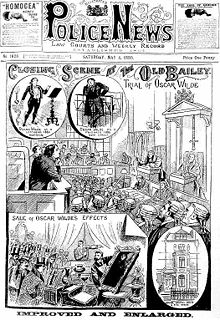 Oscar Wilde was born October 16, 1854 in Dublin Ireland. His father was a doctor and his mother a poet. He grew up surrounded by artists and intellectuals at the literary salons organized by his mother, exposing him at an early age to culture, elegance and an appreciation for wit.
Oscar Wilde was born October 16, 1854 in Dublin Ireland. His father was a doctor and his mother a poet. He grew up surrounded by artists and intellectuals at the literary salons organized by his mother, exposing him at an early age to culture, elegance and an appreciation for wit.He graduated from Oxford University in 1878 with a classical education, a coveted award for poetry and a marvelous wit and unconventional outlook on life. He became a media giant for his time--a celebrity for his writing, his lectures and his flamboyant lifestyle and marketed himself as the personification of the Aesthetic Movement. In 1882 he delivered a series of lectures over a 10-month period in Canada and the US. Shortly after his return to England he arranged a lecture tour of Great Britain and Ireland and married a former acquaintance, Constance Lloyd. His public image of domestic responsibility as a hasband and father were undermined by indiscreet relationships with Lord Alfred Douglas (Bosie). When The Importance of Being Earnest was first performed in 1895 Wilde's fame and celebrity were at their height; however, within a couple of months he faced a scandalous court case, was found guilty of gross indecency and sentenced to two horrendous years in prison. His health deteriorated terribly, he lost all of his wealth and spent his remaining years after being released from prison in small towns in France. In 1900 he died penniless and with few friends in the world at the age of 46.
Great Britain and Ireland and married a former acquaintance, Constance Lloyd. His public image of domestic responsibility as a hasband and father were undermined by indiscreet relationships with Lord Alfred Douglas (Bosie). When The Importance of Being Earnest was first performed in 1895 Wilde's fame and celebrity were at their height; however, within a couple of months he faced a scandalous court case, was found guilty of gross indecency and sentenced to two horrendous years in prison. His health deteriorated terribly, he lost all of his wealth and spent his remaining years after being released from prison in small towns in France. In 1900 he died penniless and with few friends in the world at the age of 46.
 Great Britain and Ireland and married a former acquaintance, Constance Lloyd. His public image of domestic responsibility as a hasband and father were undermined by indiscreet relationships with Lord Alfred Douglas (Bosie). When The Importance of Being Earnest was first performed in 1895 Wilde's fame and celebrity were at their height; however, within a couple of months he faced a scandalous court case, was found guilty of gross indecency and sentenced to two horrendous years in prison. His health deteriorated terribly, he lost all of his wealth and spent his remaining years after being released from prison in small towns in France. In 1900 he died penniless and with few friends in the world at the age of 46.
Great Britain and Ireland and married a former acquaintance, Constance Lloyd. His public image of domestic responsibility as a hasband and father were undermined by indiscreet relationships with Lord Alfred Douglas (Bosie). When The Importance of Being Earnest was first performed in 1895 Wilde's fame and celebrity were at their height; however, within a couple of months he faced a scandalous court case, was found guilty of gross indecency and sentenced to two horrendous years in prison. His health deteriorated terribly, he lost all of his wealth and spent his remaining years after being released from prison in small towns in France. In 1900 he died penniless and with few friends in the world at the age of 46. His works were banned for about ten years following his death, but by the 1920's his plays were being shown again and soon his works were once again dominating the literary world--second only to William Shakespeare.
